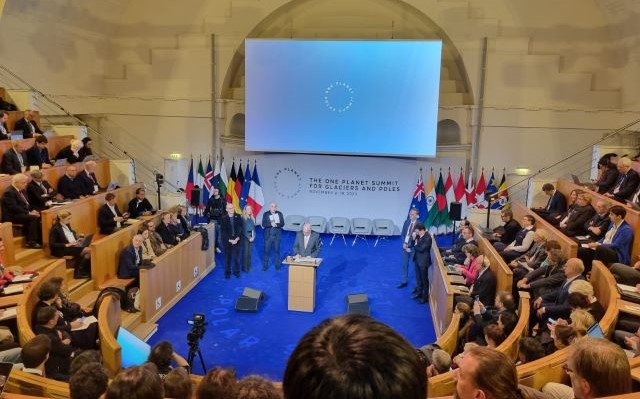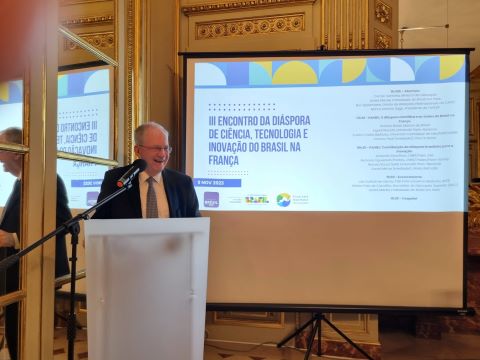

The purpose of the Paris summit was to alert world leaders to the impact of climate change on the cryosphere (photo: FAPESP)
The One Planet Polar Summit was attended by people from over 40 countries, including researchers, experts, members of business enterprises and nonprofits, and representatives of Indigenous Peoples.
The One Planet Polar Summit was attended by people from over 40 countries, including researchers, experts, members of business enterprises and nonprofits, and representatives of Indigenous Peoples.

The purpose of the Paris summit was to alert world leaders to the impact of climate change on the cryosphere (photo: FAPESP)
Agência FAPESP – At the invitation of the French government, FAPESP took part in the first international summit devoted to glaciers and poles, the One Planet Polar Summit, held at the National Museum of Natural History in Paris on November 8-9 as part of the Paris Peace Forum.
The event was supported by the World Meteorological Organization (WMO) and the United Nations Organization for Education, Science and Culture (UNESCO). It was attended by people from over 40 countries, including researchers, scholars, members of business enterprises and nonprofits, and representatives of Indigenous communities in the various regions concerned. Political leaders joined in later.
“The purpose of the meeting was to alert leaders to the impact of climate change on the cryosphere [the frozen parts of Earth, including ice sheets and glaciers, permafrost, and ice caps]. Some 200,000 glaciers in Africa, the Americas, Antarctica, Asia, Europe and Oceania have already retreated irreversibly, and at least half of these glaciers could disappear completely by 2100,” said Marco Antonio Zago, President of FAPESP, who attended the event with Fernando Menezes, its Chief Administrative Officer.
The French government has taken steps reflecting concern about glaciers for some time. In 2022 it began investing in research and seeking international cooperation to protect the cryosphere.
The “Paris Call for Glaciers and Poles” issued at the end of the summit calls for more in-depth scientific research on the cryosphere that takes into account the knowledge of local communities and Indigenous Peoples, joint research funding, monitoring and protection of the cryosphere, and sharing of data on the ecosystems involved.
It proposes a “decade of glacier and polar/cryosphere science from 2025 to 2035” and calls for more education to raise public awareness of the importance of glaciers, snow and ice in the climate system and hydrological cycle, as well as the unique features of and threats to polar biodiversity.
More information about the summit is available at: oneplanetsummit.fr/en/events-16/one-planet-polar-summit-284.
International cooperation
At the invitation of the Brazilian Embassy in Paris, Zago and Menezes participated in the Third Meeting on the Brazilian Science, Technology and Innovation Diaspora, attended by more than 100 Brazilian researchers and entrepreneurs in the French capital on November 9.

Marco Antonio Zago, President of FAPESP (photo: FAPESP)
“I told those interested in returning to Brazil that FAPESP offers several forms of support to help them get settled in São Paulo. And to those who are already integrated into the French research and innovation ecosystems, I pointed out that FAPESP offers alternatives for collaboration via agreements with funding agencies, universities and research institutions,” Zago recalled.
FAPESP has collaboration agreements with such French research institutions as the National Research Agency (ANR), the National Center for Scientific Research (CNRS) and the Biodiversity Research Foundation (FRB), among others, as well as a dozen higher education and research institutions across France.
FAPESP and ANR, for example, have successively renewed a bilateral agreement signed in 2011, and the number of submissions thereunder has risen in recent years. Forty-four proposals were submitted under the 2023 call, and ten were approved. The 2024 call, which includes health-related topics, is in progress and has already received a record 74 consultations regarding eligibility.
“With ANR, we also participate in multilateral initiatives such as the Belmont Forum, the Global Research Collaboration for Infectious Disease Preparedness (GloPID-R), and the Trans-Atlantic Platform for Social Sciences and Humanities (T-AP), among others,” Zago noted. “Indeed, during this visit to France, we met with Dominique Dunon-Bluteau, ANR’s Director of Science Operations, and Honorata Plewinska, its Bilateral Collaboration Coordinator, to strengthen this collaboration still further.”
Republish
The Agency FAPESP licenses news via Creative Commons (CC-BY-NC-ND) so that they can be republished free of charge and in a simple way by other digital or printed vehicles. Agência FAPESP must be credited as the source of the content being republished and the name of the reporter (if any) must be attributed. Using the HMTL button below allows compliance with these rules, detailed in Digital Republishing Policy FAPESP.





